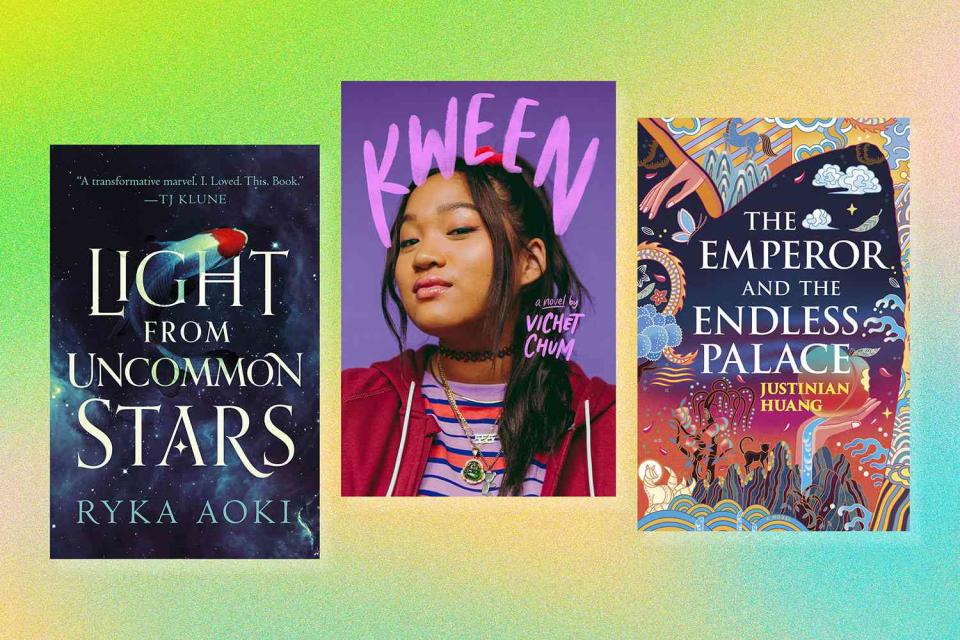Queer Asian authors Ryka Aoki, Vichet Chum, Justinian Huang talk 'spicy scenes' and authenticity in their work
As AAPI month concludes and Pride month begins, the authors offer a glimpse at their inspiration and process during a Dotdash Meredith panel.

In the final days of AAPI month, as celebrations ramp up for LGBTQ+ Pride month, Dotdash Meredith's AAPI Collective and OUTspoken employee resource groups gathered three queer Asian authors to share their stories in a candid conversation about the work they do and how it is received by the AAPI, queer, and general communities.
At the start of the conversation — moderated by DDM software engineer Jason Tseng — Light From Uncommon Stars author Ryka Aoki reflected on what inspired them, first with poetry then their novel, to tell stories that reflected their childhood in Hawaii.
"A few years back I lost both my grandparents the same year, and I realized that the stories they had were gone," Aoki said. "My family comes through Hawaii, and Hawaii has been going through some rapid changes. I realized that they're not raising sugar cane anymore on the big island. I'm not smelling cane burning, and I'm not looking at pineapple, and I'm not seeing the world that was my childhood — which I loved very dearly. And also realizing that Hawaii has a certain cache to it that people would want to write about and realizing if I didn't write about a world that I loved, I would be reading someone else's interpretation of it and it would be a lot less satisfying."
Related: Hot Stuff: Spring 2024 romance novels bring sibling bonds to the forefront
When asked about the "spicy scenes" in his novel The Emperor and the Endless Palace, author Justinian Huang admitted "you know, I I didn't realize I was writing a romance. I thought I was writing a psychological thriller, but I think that it just makes more sense to package it as a romance, to be honest."
"Growing up as an Asian man, and then coming out as a queer man," he said. "I remember feeling like I had two options as a person being raised in the West: I could either be desexualized, or I could be fetishized. I felt like I wasn't really allowed to own my own sexuality. So when I set out to write this book that starred queer Asian men in a romance with each other, I wanted to write them as beings who are fully, sexually confident — like more than sexually confident, sexually exuberant. I wanted them to to to enjoy each other sexually, and to find pleasure in each other sexually, and to be messy sexually. I think that that has shocked a lot of readers."
"My book gets slut shamed," he continued, "and I think that's because people see my name, and they see that's about Asian people.... and they're shocked to see how sex positive and how erotic and how spicy the book is. But you know, I'm working on my second book now, and I intend to continue to write spicy Asians.... I write what I know, and I know a lot of spicy Asian men."
Writing with authentic voice is something that is extremely important to Vichet Chum, whose young-adult novel Kween centers on a 16-year-old queer Cambodian girl named Soma growing up in Lowell, Mass., "which has the second biggest Cambodian population in the country. And also happens to be sort of this haven for immigrants and refugees," he says. "It's one of the most diverse cities in America.... The communities that I exist in aren't made in silos. Communities engage with one another, and sometimes in messy complicated ways."
Sign up for Entertainment Weekly's free daily newsletter to get breaking TV news, exclusive first looks, recaps, reviews, interviews with your favorite stars, and more.
Chum relied on his "young Gen Z cousin" to be his "Gen Z whisperer" when it came to authentic 2020s teenage dialogue that is a mix of cultures. But he also found it essential to infuse himself into the voice of the novel.
"I wanted to carve out this character very honestly, and at the same time offer context and show the landscape in which this character is drawing her influences from, because I also growing up — just quite candidly — I was obsessed with hip-hop, I was obsessed with poetry, I was obsessed with sort of that play of language. And so, to insert myself in that book, I also had to sort of bring myself and bring my own influences into this book. And so hopefully there's a fruitful conversation about the ways in which we interact with each other and the language we use. And at the same time, I'm showing the pathways of how that language has found its way into the voices of these young people."
Read the original article on Entertainment Weekly.


